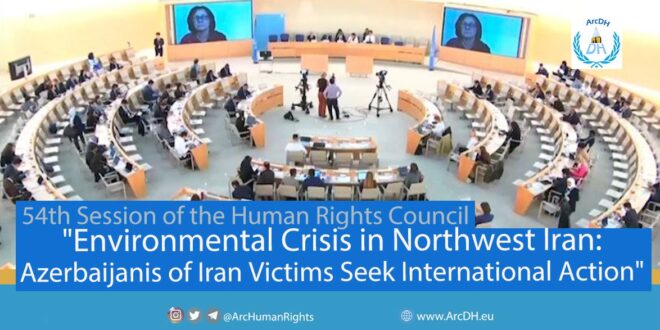The 54th Session of the Human Rights Council convened today in Geneva, Switzerland, addressing critical global issues. Among the agenda items was Item 3, an interactive dialogue with the Special Rapporteur on the implications for human rights of the environmental sound management and disposal of hazardous substances and wastes. This crucial session took place on 19th September 2023.
In a heartfelt address to the council, the Arc Association raised a pressing matter of grave concern. The organization sought to shed light on the dire plight of millions of Azerbaijani victims of pollution residing in northwest Iran along the River Araz. These river embankments, vital for various aspects of daily life including drinking, agriculture, animal husbandry, poultry, and aquatic farming, have been transformed into dumping grounds for hazardous waste.
The hazardous materials discarded in this region include radioactive material from Armenian mines and the Matsamor nuclear power plant, as well as effluent from Iranian mines like the Sungun Copper Mine and Andarian Gold Mine. The consequences of this reckless disposal have led to a significant rise in the concentration of chemical pollutants and heavy metals, including lead, mercury, cyanide, arsenic, aluminum compounds, nickel, copper, iron, manganese, and 53 other pollutants.
The environmental disaster extends its reach into nearly all spheres of ecology and human health. Alarming increases have been noted in cases of severe esophageal, stomach, and skin cancers, along with a disturbingly high incidence of liver disease. For instance, Ardabil province alone has reported 50 gastric cancer cases annually per 100,000 people.
Tragically, the true scale of ecological and environmental stress, as well as its profound impact on both human life and local flora and fauna, remains largely concealed. Azerbaijani environmentalists face formidable personal risks as they attempt to document even a fraction of the devastation. Furthermore, the response of Iranian authorities to protests, such as those in Mughan, has been to absolve themselves of responsibility, instead directing blame towards Armenia.
The Arc Association has called upon the international community to take heed of the situation’s gravity. They emphasize the absence of a transboundary catchment management plan, which inadvertently allows Iranian authorities to neglect the suffering of Azerbaijani victims. Urgent international action is required to address this environmental catastrophe and to seek justice for those affected.
ArcHumanRights
https://www.arcdh.eu
 Arcdh
Arcdh

